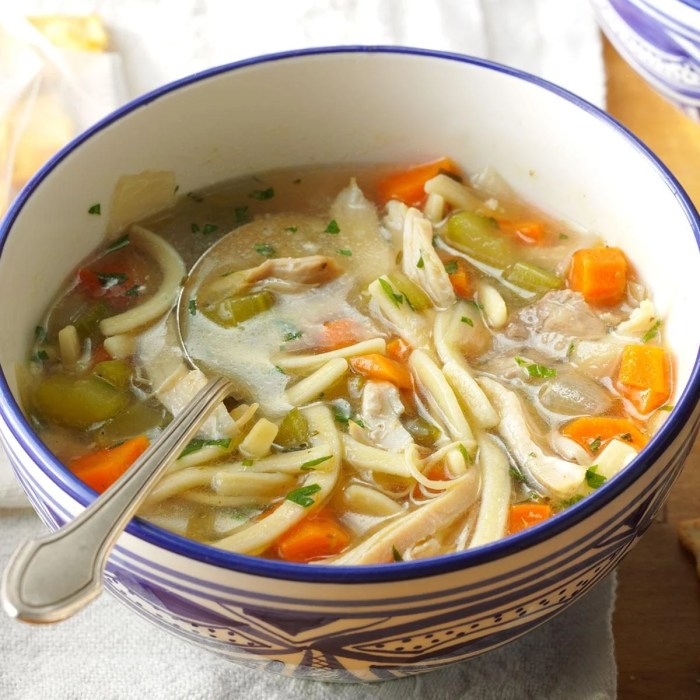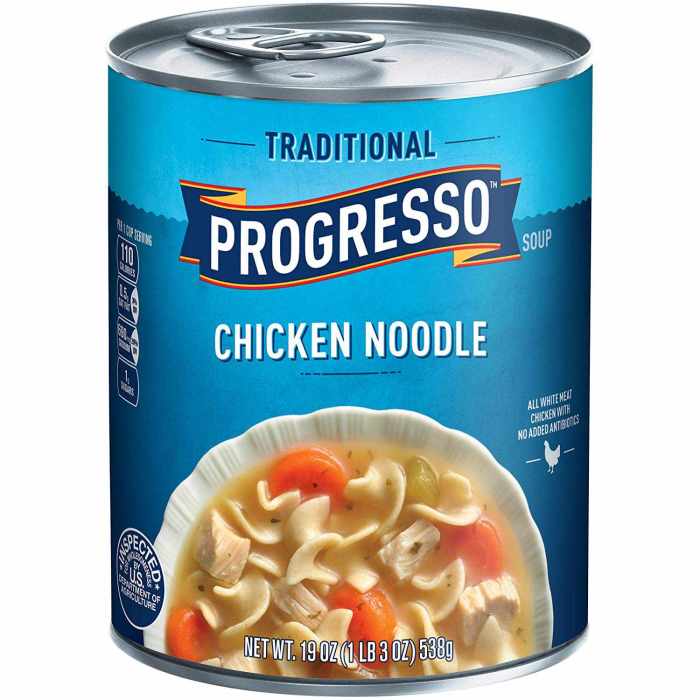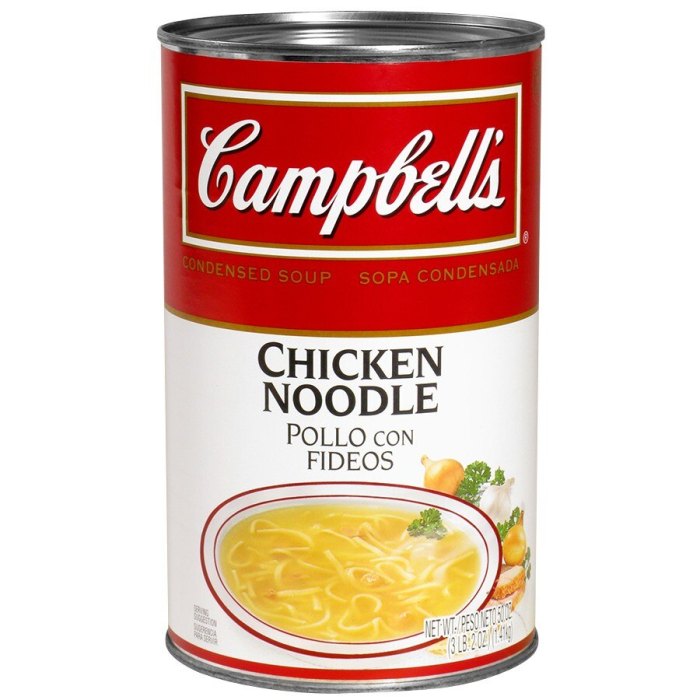Canning Chicken Noodle Soup: Recipe Variations, Process, and Safety: Canning Chicken Noodle Soup Recipe
Canning chicken noodle soup recipe – This guide provides a comprehensive overview of canning chicken noodle soup, covering recipe variations, the canning process, safety guidelines, ingredient selection, storage, troubleshooting, recipe scaling, and serving suggestions. We aim to equip you with the knowledge and confidence to safely and successfully preserve this comforting classic.
Recipe Variations
Three variations of chicken noodle soup are presented below, each highlighting a different culinary aspect: vegetarian, spicy, and low-sodium.
| Variation | Ingredients | Preparation Method Differences | Nutritional Information (per serving – approximate) |
|---|---|---|---|
| Vegetarian | Vegetable broth, carrots, celery, onions, mushrooms, noodles, vegetable seasoning | Omit chicken; increase vegetable quantity; adjust cooking time to ensure vegetables are tender. | Calories: 150, Fat: 2g, Protein: 7g, Carbohydrates: 30g |
| Spicy | Chicken broth, chicken, carrots, celery, onions, noodles, diced jalapeños, chili powder, cayenne pepper | Add jalapeños and spices during the initial sautéing stage; adjust cooking time to allow spices to meld. | Calories: 200, Fat: 5g, Protein: 10g, Carbohydrates: 35g |
| Low-Sodium | Low-sodium chicken broth, chicken, carrots, celery, onions, noodles, herbs (parsley, thyme), low-sodium seasoning | Use low-sodium ingredients throughout; adjust seasoning carefully to enhance flavor without excess salt. | Calories: 180, Fat: 3g, Protein: 9g, Carbohydrates: 32g |
Canning Process & Safety

Source: tmbi.com
Proper canning techniques are crucial for food safety. The following steps ensure your chicken noodle soup is safely preserved.
- Sterilize jars and lids: Wash jars and lids in hot, soapy water. Rinse thoroughly. Place jars in a large pot, cover with water, and bring to a boil for 10 minutes.
- Prepare the soup: Follow your chosen recipe. Ensure the soup is thoroughly cooked before canning.
- Fill the jars: Leave 1-inch headspace at the top of each jar. Remove air bubbles by running a non-metallic utensil around the inside of the jar.
- Wipe jar rims: Clean the rims of the jars with a damp cloth to ensure a proper seal.
- Place lids and rings: Secure lids and rings onto the jars.
- Process in a pressure canner: Follow the manufacturer’s instructions for processing time based on your altitude. Generally, pint jars require about 75 minutes at 10-15 PSI, while quart jars need about 90 minutes.
- Cool and check seals: Allow jars to cool completely. Press down on the center of each lid; if it doesn’t flex, the seal is successful.
Canning Safety Checklist: Always sterilize equipment, follow recommended processing times, ensure proper seals, and store canned goods in a cool, dark place.
Ingredient Selection & Sourcing
Using high-quality ingredients directly impacts the flavor and safety of your canned soup. Consider these factors:
- Chicken: Opt for bone-in, skin-on chicken pieces for richer flavor and better broth.
- Noodles: Egg noodles hold their shape well during canning.
- Broth: Homemade broth offers superior flavor and control over sodium content, while store-bought broth provides convenience.
Storage & Shelf Life

Source: thespruceeats.com
Proper storage is key to maintaining the quality and safety of your canned soup.
- Storage: Store canned soup in a cool, dark, and dry place, ideally at a temperature below 70°F (21°C).
- Shelf Life: Properly canned chicken noodle soup can last for 12-18 months.
- Labeling: Each jar should be clearly labeled with the contents (“Chicken Noodle Soup”) and the canning date (e.g., “October 26, 2024”). A visual representation would show a label neatly affixed to the jar, with the information clearly printed or written in permanent marker.
Troubleshooting & Common Issues
Addressing potential issues proactively ensures successful canning.
| Problem | Cause | Solution |
|---|---|---|
| Improper Seal | Insufficient headspace, unclean jar rims, improper lid placement | Ensure proper headspace, clean rims thoroughly, and correctly place lids and rings. |
| Spoilage | Insufficient processing time, inadequate sterilization | Follow recommended processing times and sterilize equipment properly. |
| Bulging lids | Spoilage due to bacterial growth | Discard any jars with bulging lids. |
Recipe Scaling & Adaptation, Canning chicken noodle soup recipe
Adjusting recipe quantities is straightforward.
| Batch Size | Chicken (lbs) | Broth (cups) | Vegetables (cups) | Noodles (cups) |
|---|---|---|---|---|
| Small | 1 | 4 | 2 | 1 |
| Medium | 2 | 8 | 4 | 2 |
| Large | 4 | 16 | 8 | 4 |
Seasonal adaptation involves substituting vegetables based on availability. For instance, summer squash could replace carrots in the warmer months.
Serving Suggestions & Pairings

Source: webstaurantstore.com
Enhance your canned chicken noodle soup experience with these suggestions.
- Serving Suggestion 1: Serve with a side of crusty bread for dipping.
- Serving Suggestion 2: Top with fresh herbs like parsley and chives.
- Serving Suggestion 3: Add a dollop of sour cream or crème fraîche for richness.
Complementary side dishes include a simple green salad or grilled cheese sandwiches.
FAQs
Can I use frozen chicken for this recipe?
Yes, fully cooked, thawed frozen chicken works well. Ensure it’s thoroughly cooked before adding it to the soup.
How long will the canned soup last?
Properly canned chicken noodle soup can last for 12-18 months in a cool, dark, and dry place.
What if my jars don’t seal properly?
If jars don’t seal, refrigerate the soup and consume it within a few days. Check for causes like improper lid placement or insufficient processing time.
Canning chicken noodle soup is a rewarding process, preserving a classic comfort food for later enjoyment. For a different, yet equally satisfying approach to hearty soup preservation, consider exploring the vibrant flavors of a cajun ninja vegetable soup recipe ; its unique spice profile offers a fascinating contrast. Returning to chicken noodle soup, remember to meticulously follow safe canning procedures to ensure food safety and long-term quality.
Can I can this soup in a pressure cooker?
While a pressure cooker can be used for canning, it’s generally recommended to use a water bath canner for this recipe to ensure proper safety and prevent botulism.
